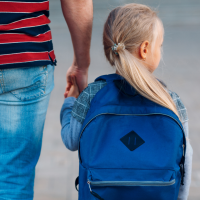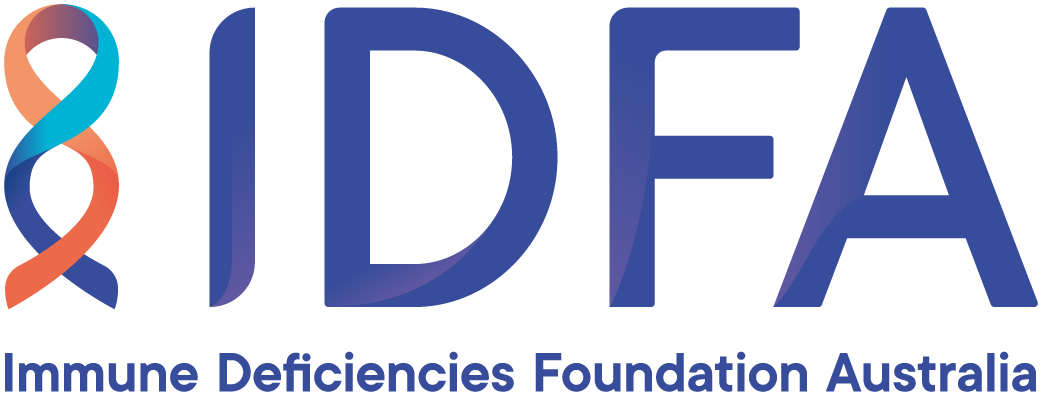Back to School Tips for Parents and Carers of PID/SID Children
This information has been provided by an IDFA member to offer you and your child some tips and tools for a smooth transition back to school this year. This IDFA member has significant experience in leadership positions across a broad range of school contexts and offers suggestions from the perspective of an educator who has an immunodeficiency.
Please note that this is general advice only and should not replace the advice given by your child’s medical team. Members accept responsibility for their own medical treatment and decisions with their treating clinicians.
For more information on this topic, we also recommend our Guide For Schools resource which you can read here.

It is natural to be feeling a little anxious as your children return to school during these tricky COVID-19 times. Here are some strategies which may assist you for a smooth return to the classroom, wherever that may be!
- Vaccination, Vaccination, Vaccination.
Work with your medical team to have both your child and your family vaccinated as soon as is indicated.
Remain up to date with the vaccination program in your state.
Reassure yourself and your child that the vaccination program for COVID-19 is statistically proven to protect the health and wellbeing of everyone.
Tips:
- Depending on your child’s previous encounters with needles and injections, a small bribe may be in order as you explain to your child the need for the needle, and how it will be like putting a suit of armour over themselves to help keep them as safe and as healthy as they can be.
- If your child has difficulties in having a needle (and let’s be truthful, it’s not our most favourite thing to do), try to work with your provider, perhaps through your GP Clinic, to alert staff to the fact that your child has previously experienced health issues and they are not keen on needles. This allows the team to be aware of the situation prior to the appointment and hopefully have some tricks up their sleeves too.
- Try to avoid a huge build-up and try to establish the timing of the vaccination so that you and your child are not anxiously waiting in lines, inducing further concern. Perhaps pre-arrange and organise to ring ahead to see how the clinic is running to gauge your arrival and wait time.
- If you promise a “Reward for Needle Bravery”, be sure that you have it ready to go to continue building trust in such situations – it can be a big thing for kids of all ages, and even many adults!
- Check for any reactions to the vaccination as informed by your medical team.
- Be informed and remain informed about the health and safety measures and guidelines that have been established by your school community.
Tips:
- Be informed about how your school community is responding by accessing school newsletters, authorised school social media groups, class groups etc.;
- Continue to network with other parents and carers;
- Make an appointment with the relevant person in your school to discuss any issues or questions that you may have;
- Check in with reputable online communities such as IDFA for ongoing information;
- Remain in touch with medical and support teams as required or requested.
- Inform the School
Tips:
- Inform the school of your child’s specific condition and provide a simple overview summary which includes a photo of your child, their condition, signs and symptoms and action required to be undertaken by the school;
- Schools are aware of many medical issues and needs of students, however an immunodeficiency can manifest itself in very many ways depending on the individual, so knowledge around this area is often not very well known – you need to try to be the educator without telling anyone how to do their job or making your child sound “very needy”.
- Include clearly displayed EMERGENCY CONTACTS that the school can contact if your child becomes unwell;
- Outline any simple and authorised treatments which may assist your child until you or an authorised family member arrives to collect your child;
- Depending on the policies of the school, provide the school nurse/sickbay with clearly labelled medication by a doctor and dispensed appropriately, for you to authorise the school to commence immediately for your child;
- Provide emergency medical contact numbers in case assistance is required as backup;
- Clearly state if your child experiences a particular response where you require an ambulance to be dispatched immediately and have information available to be given to carers in such situations;
- Organise to meet with specific and appropriate school staff to discuss the response that your child requires in such circumstances;
- Ensure that this information is also provided to sporting team coaches, managers, or private tutors.
You are your child’s advocate when they feel like they may not have, nor want to have a voice – you know your child best and you need to convey their needs clearly.
- Understand and assist your child in complying with health measures.
Know the current health advice in your state or territory. Request for any additional measures as advised by your medical and support teams. Reassure your child that although a little unusual, certain measures need to be taken to keep them happy, safe and well.
- Face masks – Briefly explain that the job of wearing a facemask is to keep both them and others safe. Show your child the correct way to put on a face mask with minimum contact (check the internet for examples). Ensure that your child is given some “trial runs” of wearing the mask at home for increasing periods of time to try to “normalise” the experience and sensations. Show your child how to wear their masks properly – covering both the mouth and the nose and not tucked under their chin, or pulled down from their nose. If possible allow your child to select their own mask/s, and if permitted by the school, name and decorate it to make it more personal and easy to identify. Stress with your child that when wearing a facemask, that facial expression and volume of speech is affected – encourage them to speak clearly and a little bit louder, use their eyes to help convey meaning and expression and look clearly at others expressions also to help them navigate their way through the learning experience. Let your child know that they will need to concentrate more fully to both speak and listen to others. If wearing a facemask during a school break time, stress the importance of wearing a mask if indicated and ensure that your child remains socially connected and emotionally well-supported during these “isolating” times.
- Explain other safety measures
- Social Distancing: Try to help your child understand that they need to remain “distanced appropriately”, particularly during break times at school where students are able to socialise more freely. This one is tricky, as whilst you need your child to understand in “broad brushstrokes” the risks, you do not want to escalate a sense of panic, worry or greater isolation socially within class groups.
- Maintaining Good Hand Hygiene: Stress the importance of good and appropriate hand hygiene with your child. Depending on your child’s age, show them how to wash their hands thoroughly and then use a hand sanitiser. Although schools will have hand sanitiser available for staff and students in differing ways, having a small, pocket-sized hand sanitiser that your child tolerates well and can carry themselves in either their pocket, bag or pencil case is a good idea. Good hand hygiene is one of the simple ways to assist in protecting your child and all of the community.
5. Clear communication is key
Speaking and clarifying things with your child, your family, your school and your medical and support teams is essential to enhance both the understanding of your child’s condition and what the conditions mean for your child.
Having an immunodeficiency is not incredibly well known by many and as the various responses to this condition varies so much from person to person, it can sometimes be difficult to both understand, pinpoint, accept and treat. It can be difficult to manage, especially as we all try to strike the balance between leading a “normal life” with some medical challenges, through to avoiding the “boy/girl in plastic bubble” type syndrome.
Although we need to listen to our children, their and our bodies, as we respond to various “threats” in our environments, we also need to experience challenges. From experience, try to be alert but also try to “normalise” the situation as much as possible. Try to normalise many of these behaviours so that your child develops greater resiliency and both protective and appropriate problem-solving skills, as these should contribute very positively to their ongoing development.
It will require your careful attention and skills to navigate with everyone how you prepare and present portions of information and learning. In my experience people wish to know and understand how best to support your child.
In secondary school it becomes even more difficult, as your child often may not want people knowing about their condition, so that they are not seen as “different” or “unusual”. Also your child will generally have a broad range of teachers and staff, not previously experienced in primary school. This is a big adjustment where your child is already rising to the challenges of a new way of doing things, and may present you with requests to maintain their medical privacy. This can often be a careful negotiation to both respect your child’s privacy and their wishes, but must be measured up by what the learning environment and school MUST KNOW to appropriately care for your child. Perhaps a confidential meeting with a trusted educator on site would be appropriate where they assist with the dissemination of information as required throughout the staff, asking that the child not be directly approached with your contact, unless in an emergency situation.
Inform your child that as a condition of enrolment that a medical history must be provided, so that you are required to disclose their conditions. This is also especially relevant if your child is going on a school camp or sporting weekend. Please remember, that if your child has an accident or sporting injury at school which is not related to their immunodeficiency, it is still essential that the school, and if required, emergency services have your child’s most up to date medical history.
More importantly, take a breath and let the learning experience be not only a safe one, but a journey that will help your child evolve into the wonderful person that they are and were always meant to be! Best wishes for the year.
IDFA would like to send their gratitude and thanks to the member that has provided this valuable information.
